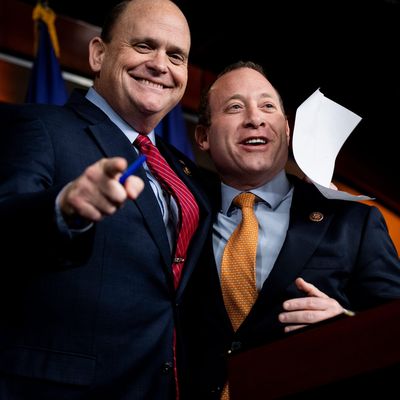
Over the past month, negotiations between Democrats and the White House over another coronavirus stimulus bill crawled to a halt, and Senate Republicans lined up behind a “skinny” stimulus proposal designed to exacerbate partisan divisions. Thus it’s the perfect time for someone to toss a compromise into the mix before everyone in Washington gives up until after the November elections. It’s the kind of challenge that the Problem Solvers Caucus was created to tackle: simply identify the provisions that both parties support and aim right down the middle on items of contention. That’s exactly what the group of 25 Democratic and 25 Republican U.S. House members aims to do in the COVID-relief plan it unveiled on Tuesday — though even its members acknowledge it has little chance of being enacted.
The $1.5 trillion proposal, being fronted by the caucus’s co-chairs, Democrat Josh Gottheimer and Republican Tom Reed, begins with a second installment of the highly popular $1,200 per person (and $500 per child) stimulus checks. While the details haven’t been published yet, the checks will probably track those made available in the CARES Act in March and proposed again in the House-passed HEROES Act in May and the White House/GOP HEALS Act released in July (though largely abandoned later in the pursuit of a “skinnier” bill that could attract fiscal fanatics). That would mean roughly 160 million checks and a price tag of $300 billion.
With this dessert as the featured item, the Problem Solvers proposal gives Republicans a COVID-19 liability shield for corporations and nonprofits, Senate Majority Leader Mitch McConnell’s top priority, and gives Democrats smaller versions of spending categories they’ve pressed in the HEROES Act, as the New York Times explains:
The measure would reinstate lapsed federal jobless aid at $450 per week for eight weeks, then replace up to $600 weekly in lost wages for an additional five weeks. That is more than Republicans wanted, but less than the flat, $600-a-week benefit that lapsed at the end of July, which Democrats have insisted must be extended in full. And the proposal would send $500 billion to strapped state and local governments, less than the nearly $1 trillion Democrats included in their $3.4 trillion stimulus plan that passed the House in May, but roughly double what the White House has signaled it could support …
In addition to money for state and local governments and for schools, lawmakers included $100 billion for testing, contact tracing and other health initiatives to try to increase the nation’s testing capacity to three million tests a day. There is money for expanding rural and urban broadband, supporting agricultural workers and extending the 2020 census to ensure an accurate count.
The bill would allocate $25 billion for mortgage and rental assistance, $130 billion for schools and $15 billion for the beleaguered Postal Service, as well as separate funds to administer the 2020 elections during a health crisis and for food assistance programs.
The congressional Republican leadership is not likely to leap on a proposal sure to alienate the hard-core conservatives for whom the “skinny stimulus” was a stretch. And Nancy Pelosi and Chuck Schumer, who know Democrats have superior leverage thanks to their control of the House and enough votes to block any legislation in the Senate, have already offered to slice more than a trillion dollars from the price tag of the HEROES provisions and may be loath to move unilaterally again.
So if there’s any likely buyer for the Problem Solvers compromise, it might be the White House, where Donald Trump is facing an uphill climb to November and could really use improved public perceptions of his handling of COVID-19 and the fallout. The hardest pill for him to swallow would probably be the state-and-local assistance, given his frequent denunciation of prior Democratic proposals as representing “bailouts” of profligate governments and his current war with “Democrat cities” as alleged hellholes teeming with swarthy looters itching to spill over into pristine suburbs.
Gottheim and Reed have acknowledged their proposal is primarily intended to restart negotiations, so the question is whether anyone of significance reacts favorably instead of kicking the can down the road past November.






























